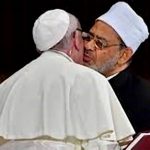by Burak Bekdil – The Gatestone Institute –
The world’s “strategic eyes” should have looked closer at Turkish President Recep Tayyip Erdoğan’s speech in September at the UN General Assembly. It was another warning to the West about his intended Islamist design for the entire world — not that he can accomplish this ambition, but what he aims for comes in with several red flags with it.
In his speech, greeted as a brave international challenge by the Turkish media (90% of which he controls), he called on the international community to collectively fight what he thinks is the greatest malady of mankind: Islamophobia. He wants, he said, to revolutionize the post-World War II international political order by giving Muslim nations a permanent seat on the UN Security Council. “The world is bigger than five” has been his dictum over the past several years. He wants Muslim nations, preferably Turkey, to have a veto power, via the UN, over a new world order.
That is not all. Erdoğan wants the world to recognize the breakaway Turkish statelet of Turkish Republic of Northern Cyprus, recognized only by Turkey. That statelet emerged after Turkey’s illegal invasion of Cyprus in 1974.
In his speech, Erdoğan discredited the UN peacekeepers on Cyprus. He vowed to fight alongside Azerbaijan against Armenia in the Nagorno-Karabakh dispute. And, not surprisingly, he asked for global support for the Palestinian cause.
On the lighter side of things, he became the world’s laughing stock when he complained that he was uncomfortable with the use of what he described as “LGBT colors” at the United Nations building, which is decorated with bright colors promoting the Sustainable Development Goals. Erdoğan said he would have liked to discuss it with UN Secretary-General António Guterres. “One of the issues that bothers me the most,” Erdoğan said, “… is that when entering the UN General Assembly, you see the LGBT colors on steps and other places.”
Still not all. Erdoğan admitted he was holding NATO hostage. On September 26, he said that the Turkish parliament would abide by his pledge to ratify Sweden’s accession to NATO if the US sticks to its commitments to deliver F-16 fighter jets to Ankara.
Sweden wants to join NATO to deter any aggression from Russia. It filed an application after Russia’s invasion of Ukraine in early 2022, together with neighboring Finland, which was welcomed into the alliance in April. All member states have to agree on newcomers, and Turkey is the main holdout. Political analysts agree that the delay threatens to stoke tensions between Turkey and its US-led NATO allies, who are increasingly impatient to see Sweden a member.
Meanwhile, at home, a brave Turkish journalist broadcast a video showing Islamic State (ISIS) terrorists being detained in Turkey, then released and sent to government-run camps for military training. The “trained” terrorists include ISIS’s top command, the video showed. No government official has denied the footage by prominent journalist Ismail Saymaz, a government critic and columnist for the opposition Sözcü daily.
Although rarely visible in the public domain, there are realistic politicians who understand the Western world’s Erdoğan problem better than many self-deceiving optimists. One is a French Member of the European Parliament, Thierry Mariani, who in a September speech put the diagnosis plainly: “Erdoğan gets his strength from two things: Our loss of strength and our [strategic] blindness.”
In Erdoğan’s worldview, Islamophobia is the greatest threat to humanity. Radical Islamist suicide bombers and torturers are not.
________________________
https://www.gatestoneinstitute.org/20018/erdogan-muslims-un-seat





